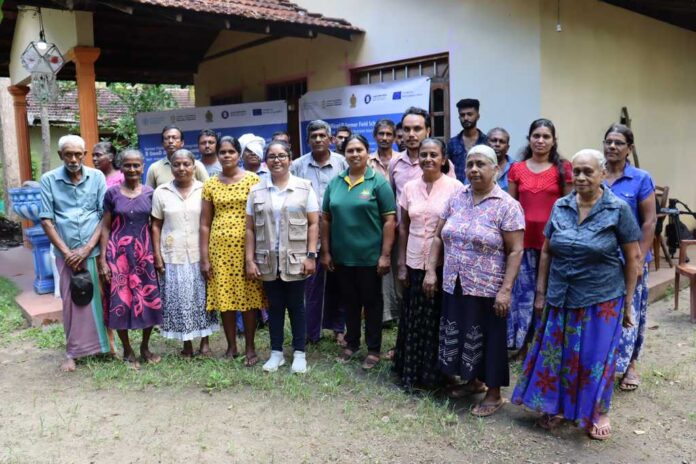In ancient times, Sri Lanka (Ceylon) was known as the ‘Granary of the East’ as the traditional farming methods which were practiced and passed on from generation to generation helped the island nation produce enough grain not only to feed its people but to feed others in foreign lands. With the advancement of technology and the introduction of chemical fertilizers to Sri Lanka in the early 1960’s yields increased by as much as 60% and traditional farming methods were soon forgotten. Furthermore, chemical fertilizers were available in abundance and at subsidized rates, which resulted in farmers using more chemical fertilizer than what was recommended with the hope of boosting their yield. But sadly, they (the farmers) were not aware that the overuse of chemical fertilizers results in serious soil degradation, nitrogen leaching, soil compaction, reduction in soil organic matter, and loss of soil carbon or in other words stripping the soil of essential nutrients.
In April 2021, when the Sri Lankan government, in a bid to promote organic agriculture imposed a ban on the import of agrochemicals, yields dropped drastically and resulted in a severe food crisis. Plants were stunted as the soil in most farmlands had lost most of its nutrients which resulted in stunted plant growth. When the ban on the import of chemical fertilizers was lifted on 30th November 2021, the farming community was struggling to feed themselves let alone the nation. The withdrawal of subsidies on chemical fertilizers further aggravated the crisis.
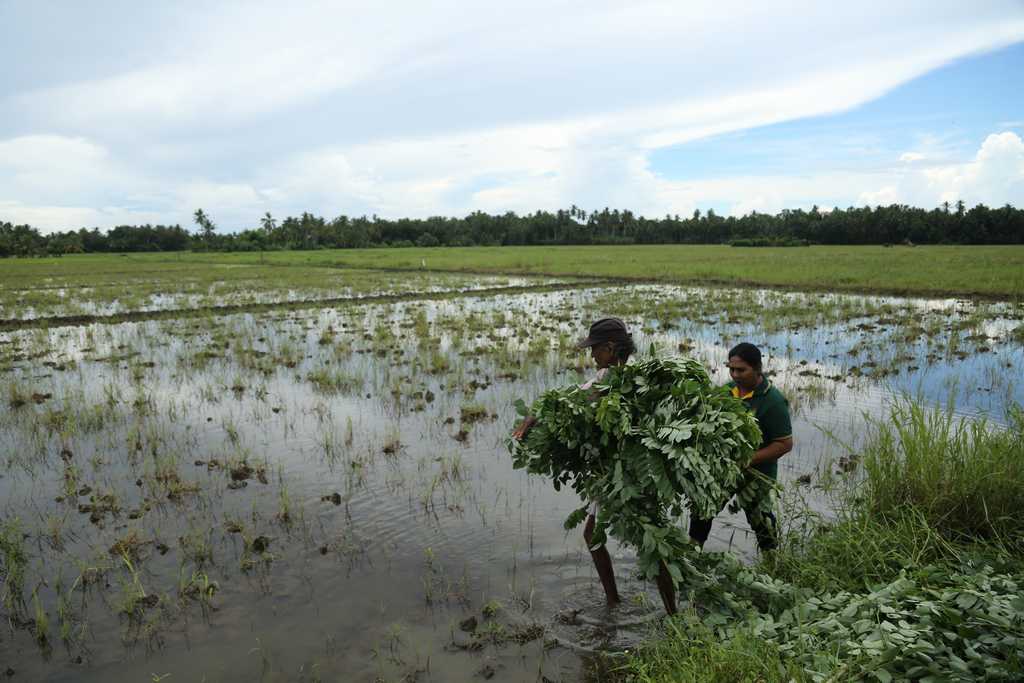
In December 2022, as a push towards more effective adaptations in paddy cultivation, the European Union (EU) provided a grant of 4 million Euros to the Food and Agriculture Organization of the United Nations (FAO) to join with the Department of Agriculture to support smallholder paddy farmers in Sri Lanka to adapt to better, sustainable and climate-smart agricultural practices to improve paddy cultivation which will enhance their income and strengthen their livelihoods.
“Responding to the Economic Crisis: Protecting smallholder farmer livelihoods with safe and efficient use of fertilizer and quality seed for better productivity in paddy farming” (GCP/SRL/080/EC) also known as the ’RiceUP’ project is being initially implemented in the districts of Ampara, Anuradhapura, Badulla, Hambantota, Matale, Polonnaruwa and Puttalam.
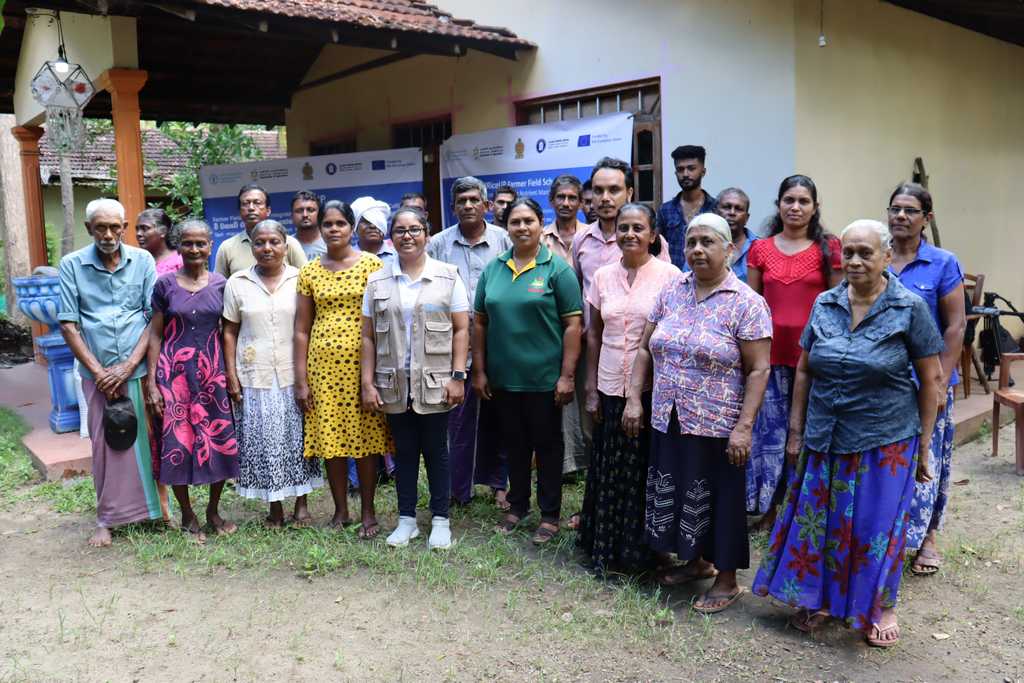
The project promotes the transition of Sri Lankan agriculture toward more sustainable farming practices, including the integration of organic fertilizer through Integrated Plant Nutrient Management (IPNM) and supporting the production of quality certified seed paddy in Sri Lanka.
It commenced with the training of 289 Agriculture Extension Officers (AEO) in four key rice growing districts – Ampara, Badulla, on how the IPNM approach is implemented in paddy cultivation. The AEOs in turn have now trained 6,000 farmers from the four districts under the ‘Farmer Field School programme’ on how the IPNM approach could be applied in paddy cultivation to promote the efficient use of fertilizers, water and other inputs.
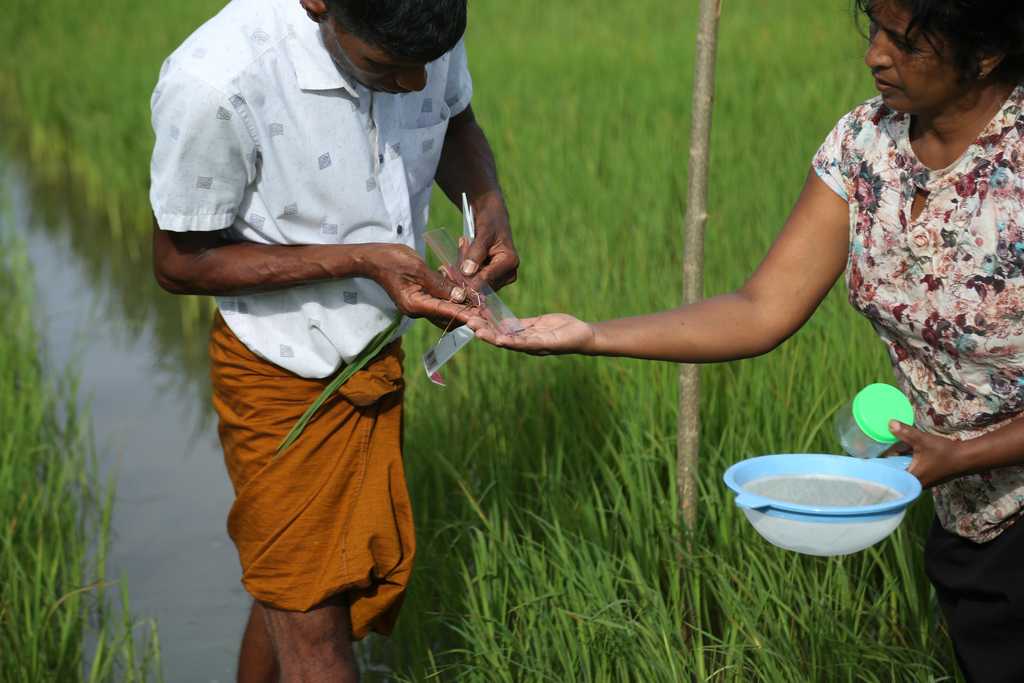
The ‘Farmer Field School programme’ facilitates soil testing and emphasizes soil management, compost, and bio-charcoal production, implementing good agronomic practices including using high-quality seed paddy, proper land preparation, the parachute method for seed broadcasting, efficient water management and effective weed, pest, and disease management, all integral components of IPNM practices.
1,200 selected farmers In Ampara, Anuradhapura, Hambantota, and Polonnaruwa districts were given 850 parachute trays each, along with fertilizer, seeds, and hands-on field training in seed paddy production.
Latha Hettiarachchi, a woman farmer who cultivates an acre of paddy land in Yodakandiya in Tissamaharama for over two decades admitted that she had been administering chemical fertilizer without proper knowledge of the amount of fertilizer her paddy field required. She said that it was only after the soil in her field was tested under the IPNM programme that she realized that she had been administering more chemical fertilizer than the soil required. She said that by attending the ‘Farmer Field School’ she had learnt of ways to increase her yield and profit.
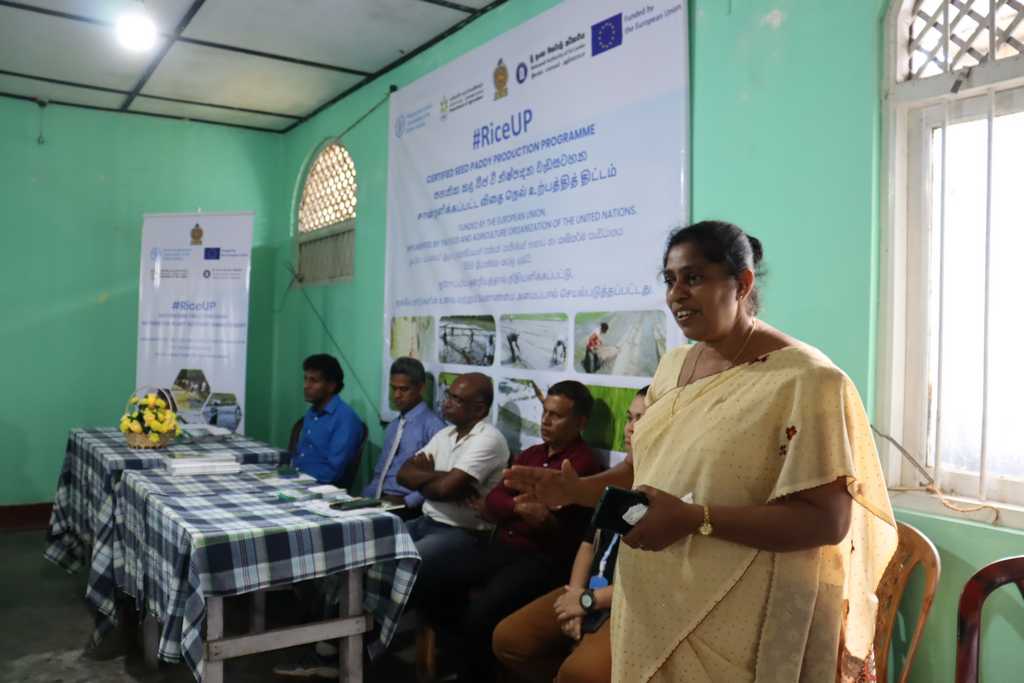
Aduru Hewage Kusumawathy a resident of Goda Koggalla in Ambalanthota was excited to be selected for the project and will be producing seed paddy when she next cultivates her 2 acres of paddy land in Mayurapura.
The ‘RiceUP’ project targets paddy farmers with no prior experience in certified seed paddy production. Returns from successful seed paddy production initiated through the project are likely to encourage most farmers to continue practicing certified quality seed paddy production, thereby enhancing the availability and accessibility of certified seed paddy in the country. With the support of Agriculture Extension Officers, farmers in some areas are forming farmer societies to ensure the continuity of seed paddy farming through collaborative efforts.
According to the FAO the project’s broader objectives include meeting the country’s demand for quality seed paddy, strengthening government-owned seed farms, and enhancing seed production. Plans involve increasing seed paddy production by 16% – 20%, reaching an annual formal seed supply of 24,000 tons, up from 19,200 tons.
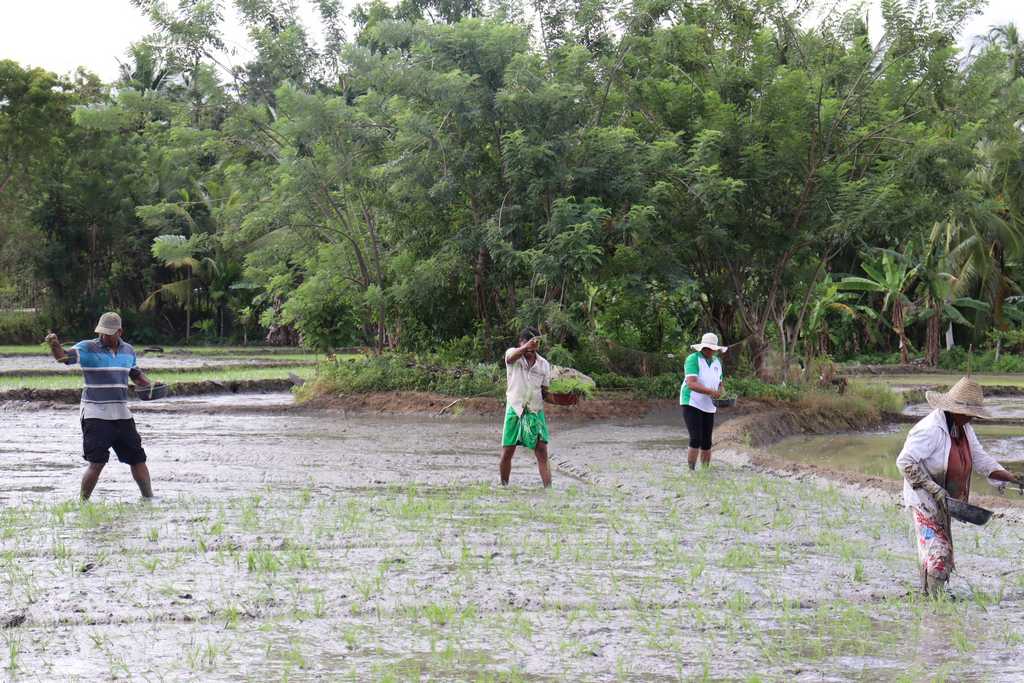
During a meeting in Embilipitiya, Provincial Director (Agriculture) Ms. Nalika Rubasingha, said “The ‘RiceUP’ project is the first step towards improving paddy cultivation in post crisis Sri Lanka. Management of fertilizer use, water management, pest management, use of quality certified seed paddy and weed management are the main areas of attention that when implemented, will increase productivity in paddy cultivation. The unpredictable weather patterns due to climate change, has impacted seed paddy production”. She added that it was important to create a market for the farmers who have undertaken to produce seed paddy under the ‘RiceUP’ project and suggested that the Bata-Atha seed paddy farm can become the main source of supplying quality certified seed paddy to other farmers in the Island.
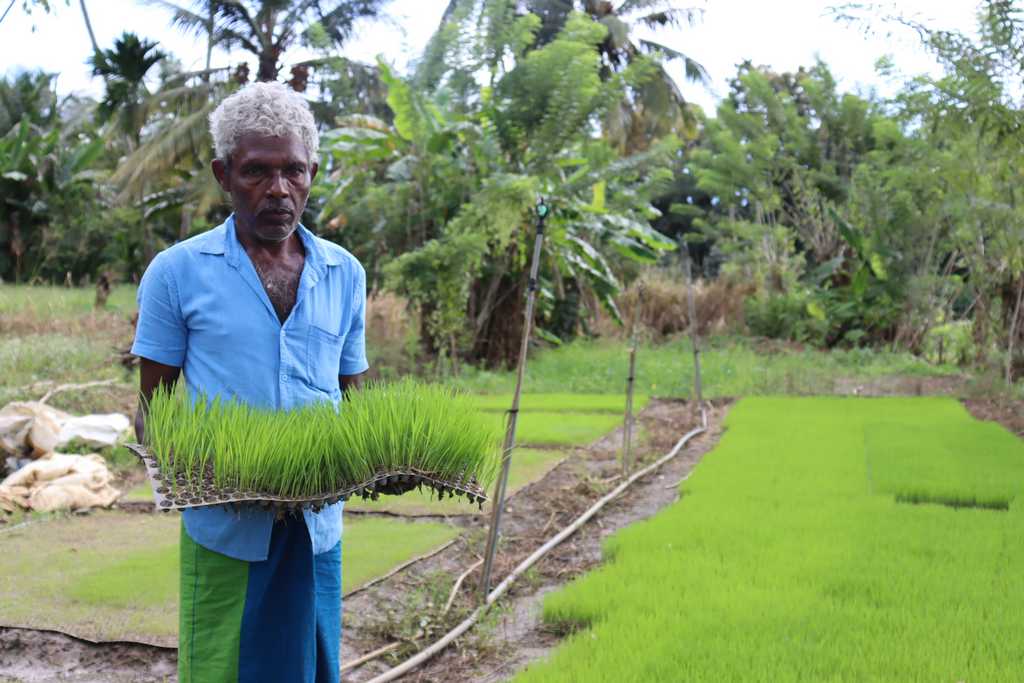
She said with the implementation of the ’RiceUP’ project it was expected that the seed paddy produced in the Hambanthota District will increase to 7.5MT from the 4.5 MT produced at present.
‘RiceUP’ is a project funded by the European Union (EU) implemented by the Food and Agriculture Organization of the United Nations (FAO) in partnership with the Ministry of Agriculture, Department of Agriculture, Mahaweli Authority of Sri Lanka (MASL), the Department of Agrarian Development and the active participation of multiple stakeholders in the paddy sector including related government institutions and private sector agencies.

